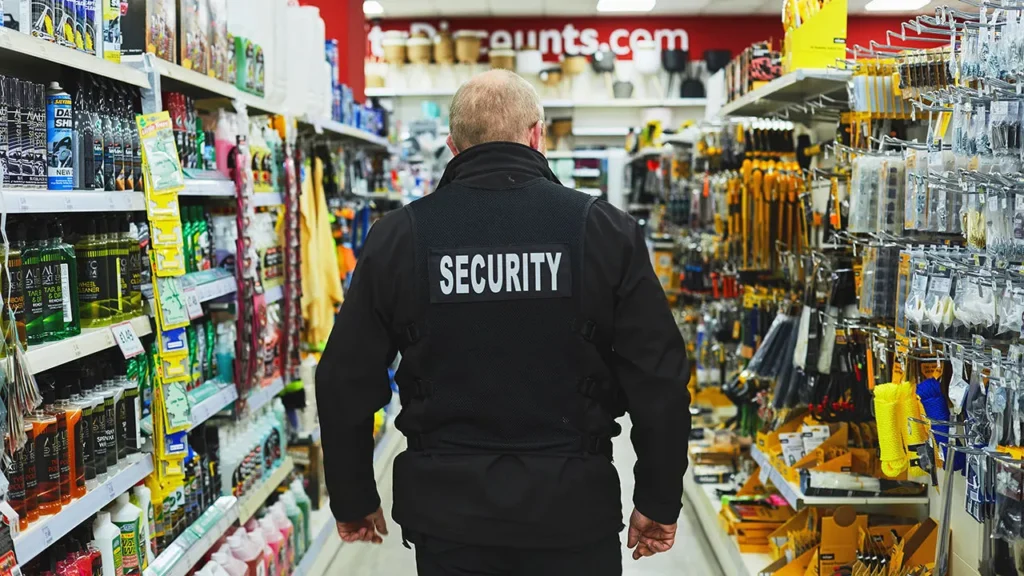Yes, UK stores can detain shoplifters under specific conditions outlined in the Police and Criminal Evidence Act 1984 and the Criminal Law Act 1967. Security guards or citizens can make a citizen’s arrest with credible evidence, but searches require consent and must be conducted by the same sex.
However, reasonable force is permitted, but breaching company policy could lead to dismissal. It’s emphasized that detaining shoplifters without proper training is risky. These laws apply to both security guards and ordinary citizens, but adherence to company policy, common sense, and safety is paramount.
What Is Shoplifting?

Shoplifting is when someone takes stuff from a store without paying for it. It’s not just about hiding things in bags, it includes changing price tags, working with others to distract staff, and even tricking stores with returns. Shoplifting causes problems for stores, not just financially but also with security.
Types of Shoplifting Incidents
Concealment: This involves hiding merchandise on one’s person, inside clothing, bags, or other personal items, to avoid detection while leaving the store.
Altering Labels or Packaging: Shoplifters may switch price tags, remove security devices, or manipulate packaging to pay a lower amount or avoid detection.
Collaborative Shoplifting: In some cases, multiple individuals work together to distract store employees while others engage in shoplifting activities.
Return Fraud: Shoplifters may steal items, and then attempt to return them for a refund or store credit, exploiting the store’s return policy.
Employee Theft: Internal theft, where store employees pilfer merchandise, is also considered a form of shoplifting.
Shopping Cart Thefts: Some shoplifters may fill shopping carts with merchandise and attempt to leave the store without paying.
What Are the Best Practices in Store Policies for Detaining Shoplifters?
Store policies on detaining shoplifters vary but generally align with legal and ethical standards. Many retailers have protocols that prioritize the safety of both employees and customers. These policies often emphasize the importance of proactive prevention, such as vigilant customer service, the use of security cameras, and the implementation of anti-shoplifting measures.
Some key components of common store policies include:
Non-Confrontational Approaches: Policies may encourage employees to adopt non-confrontational methods, such as offering assistance or maintaining a visible presence to deter potential shoplifters.
Training and Education: Many retailers provide training for employees on recognizing suspicious behavior, understanding the legal parameters of detainment, and promoting effective communication with law enforcement.
Use of Technology: Policies often incorporate the use of technology, such as surveillance systems and electronic tags, to enhance security measures and facilitate the identification of potential shoplifters.
Legal Compliance: Store policies should align with local laws and regulations regarding the detention of suspected shoplifters. This includes understanding the limits of citizen’s arrest and the appropriate use of force.
Importance of Clear and Visible Store Policies
Clear and visible store policies on detaining shoplifters serve several crucial purposes
Deterrence: Knowing that a store has clear policies and effective security measures in place can deter potential shoplifters, reducing the likelihood of theft.
Employee Guidance: Clear policies provide employees with guidelines on how to handle suspected shoplifting situations, promoting consistency and minimizing the risk of misunderstandings.
Legal Protection: Well-defined policies help protect the store legally by ensuring that employees act within the boundaries of the law when detaining shoplifters. This can prevent legal complications and liabilities.
Customer Confidence: Visible policies contribute to a sense of security for customers, fostering trust in the store’s commitment to safety and loss prevention.
Training and Awareness: Visible policies serve as a constant reminder to employees about the importance of adhering to established procedures, promoting ongoing training and awareness.
What Are The Legal Considerations in the UK?

Citizen’s Arrest in the UK
In the UK, the power to make a citizen’s arrest is regulated by the law. This means that ordinary people, including store employees, have the right to detain someone they believe has committed a crime, such as shoplifting.
However, several important conditions must be met for a citizen’s arrest to be lawful. These include having a reasonable belief that a crime has been committed, ensuring the use of force is proportionate, and promptly handing the detained person over to the police.
The Role of Reasonable Force in Detaining a Shoplifter
When it comes to detaining a shoplifter, the use of force is a critical aspect that needs careful consideration. The law allows for the use of reasonable force, but it emphasizes that the force used must be proportionate to the situation.
This means that excessive or unnecessary force could lead to legal consequences. Store employees should be trained to assess situations carefully, use the minimum force necessary for detainment, and prioritize the safety of everyone involved.
Rights and Responsibilities of Store Employees
Store employees, while having the right to make a citizen’s arrest under certain circumstances, must also be aware of their rights and responsibilities.
It’s essential for employees to understand the legal boundaries of their actions and ensure they comply with company policies.
Communication skills are crucial; employees should be trained to calmly and clearly communicate the reasons for detainment and avoid escalating the situation.
Additionally, employees have the responsibility to promptly hand over the detained individual to the police and let the legal system take its course.
FAQ
Can store employees stop shoplifters in the UK?
Yes, store employees in the UK have the right to stop and detain shoplifters under specific conditions. However, they must follow legal protocols and use reasonable force.
Has shoplifting been decriminalized in the UK?
No, shoplifting is a criminal offense in the UK. It is considered theft under the Theft Act 1968, and individuals caught shoplifting can face legal consequences.
Can you touch a shoplifter in the UK?
Yes, in certain situations, you can touch a shoplifter in the UK, but only if it’s necessary and reasonable. The use of force must align with legal standards, and excessive force could lead to legal consequences.
How serious is shoplifting in the UK?
Shoplifting is considered a serious offense in the UK. Penalties vary based on the value of the stolen goods, and individuals convicted of shoplifting can face fines, community service, or imprisonment.
What to do if you see someone shoplifting in the UK?
If you witness someone shoplifting in the UK, it’s advised to inform store staff or security. Intervening personally may not be safe, and store employees are trained to handle such situations while following legal procedures.
Can you get caught for shoplifting after leaving the store days later in the UK?
Yes, individuals can still be apprehended for shoplifting days later in the UK. Law enforcement may investigate and issue charges based on evidence, such as surveillance footage or eyewitness accounts.
What usually happens to first-time shoplifters in the UK?
First-time shoplifters in the UK may face legal consequences, including fines or community service. The response can vary, and some may be offered the opportunity to attend a diversion program instead of facing immediate prosecution.
Final words
To sum up, UK stores can detain shoplifters, but it’s important to be cautious. Misusing this power can result in legal trouble. Balancing loss prevention and following the law is necessary. Clear policies, training, and technology can help prevent theft while respecting individual rights. By staying within legal boundaries, stores create a secure environment, build customer trust, and maintain a positive reputation.

